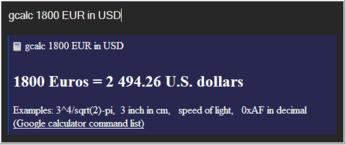Five Nifty Ubiquity Scripts

Productivity Sauce
The default Ubiquity commands make this Firefox extension one of the niftiest tools around, and the 15 Ubiquity Commands to Enhance Your Web Experience post on the Tools for Thought blog can help you to get the most out of the available commands. While the default commands allow you to perform quite a few actions, the extensible and open nature of Ubiquity means that you can easily expand its functionality by installing additional scripts that add new commands. There are dozens of Ubiquity scripts floating on the Web, but here are a few that you might find particularly useful.
Bit.ly is a relatively new URL shortening service which sports some useful features such as history, automatic Web site thumbnail creation, and click tracking. You can use Bit.ly with Ubiquity to shorten the currently selected URL courtesy of the Bit.ly Ubiquity script.
If you use the ingenious TiddlyWiki one-file wiki, you will appreciate the TiddlyWiki Ubiquity script. Using the script, you can create a new tiddler (the tw-new command), search TiddlyWiki (the tw-search command), and open TiddlyWiki (the tw-open command).
The Jetable Ubiquity script lets you use the Jetable anti-spam service without leaving the convenience of your browser. Using the scripts you can create a temporary email address that expires after a specified period of time. Use the jetable command followed by your real email address and the expiration time, and the script returns a temporary email address that links to the real one.
You probably know that Google's search engine contains a simple yet flexible calculator. Type, for example, 100 EUR in USD in Google's search field, and the engine performs currency conversion. The Google Guide provides a detailed overview of the available Google Calculator commands, and using the Gcalc Ubiquity script you can perform all the available operations from the command line.
The World Clock Ubiquity script does exactly what its name says: type time command followed by the desired location, and the script shows the time in the specified city along with the flag of the country.
You can find even more Ubiquity scripts at the project's wiki and at the Herd page.
If the script you need doesn't exist, you can easily create it yourself. In fact, you don't even have to create a script from scratch: you can simply tweak one of the existing Ubiquity scripts. For example, to create a Ubiquity script that allows me to look up a word in WordNet, I just tweaked the Dictionary script by Lukasz Tyrala, so it looks like this:
CmdUtils.CreateCommand({
name: "wn",
homepage: "http://writertools.googlecode.com",
author: { name: "Dmitri Popov", email: "writertools@gmail.com"},
license: "MPL",
description: "Look up definitions in the WordNet dictionary.",
takes: {"word to look up": noun_arb_text},
icon: "http://wordnet.princeton.edu/favicon.ico",
preview: function( pblock, theChecked ) {
pblock.innerHTML = "Word to look up: " + theChecked.text + "";
},
execute: function( wordToCheck ) {
var url = "http://wordnet.princeton.edu/perl/webwn?s={QUERY}";
var urlString = url.replace("{QUERY}", wordToCheck.text);
Utils.openUrlInBrowser(urlString);
}
}) To use the created script, you can either paste in the Command Editor (to open it, point your browser to chrome://ubiquity/content/editor.html) or embed the script in a Web page, so others can subscribe to it. To do the latter, save the script as a wn.js file and add the following line to the Web page (make sure that the path to the wn.js file is correct):
<link rel="commands" href="wn.js" type="text/javascript" name="Ubliquity WordNet Command" />comments powered by Disqus
Subscribe to our Linux Newsletters
Find Linux and Open Source Jobs
Subscribe to our ADMIN Newsletters
Support Our Work
Linux Magazine content is made possible with support from readers like you. Please consider contributing when you’ve found an article to be beneficial.

News
-
Introducing matrixOS, an Immutable Gentoo-Based Linux Distro
It was only a matter of time before a developer decided one of the most challenging Linux distributions needed to be immutable.
-
Chaos Comes to KDE in KaOS
KaOS devs are making a major change to the distribution, and it all comes down to one system.
-
New Linux Botnet Discovered
The SSHStalker botnet uses IRC C2 to control systems via legacy Linux kernel exploits.
-
The Next Linux Kernel Turns 7.0
Linus Torvalds has announced that after Linux kernel 6.19, we'll finally reach the 7.0 iteration stage.
-
Linux From Scratch Drops SysVinit Support
LFS will no longer support SysVinit.
-
LibreOffice 26.2 Now Available
With new features, improvements, and bug fixes, LibreOffice 26.2 delivers a modern, polished office suite without compromise.
-
Linux Kernel Project Releases Project Continuity Document
What happens to Linux when there's no Linus? It's a question many of us have asked over the years, and it seems it's also on the minds of the Linux kernel project.
-
Mecha Systems Introduces Linux Handheld
Mecha Systems has revealed its Mecha Comet, a new handheld computer powered by – you guessed it – Linux.
-
MX Linux 25.1 Features Dual Init System ISO
The latest release of MX Linux caters to lovers of two different init systems and even offers instructions on how to transition.
-
Photoshop on Linux?
A developer has patched Wine so that it'll run specific versions of Photoshop that depend on Adobe Creative Cloud.

